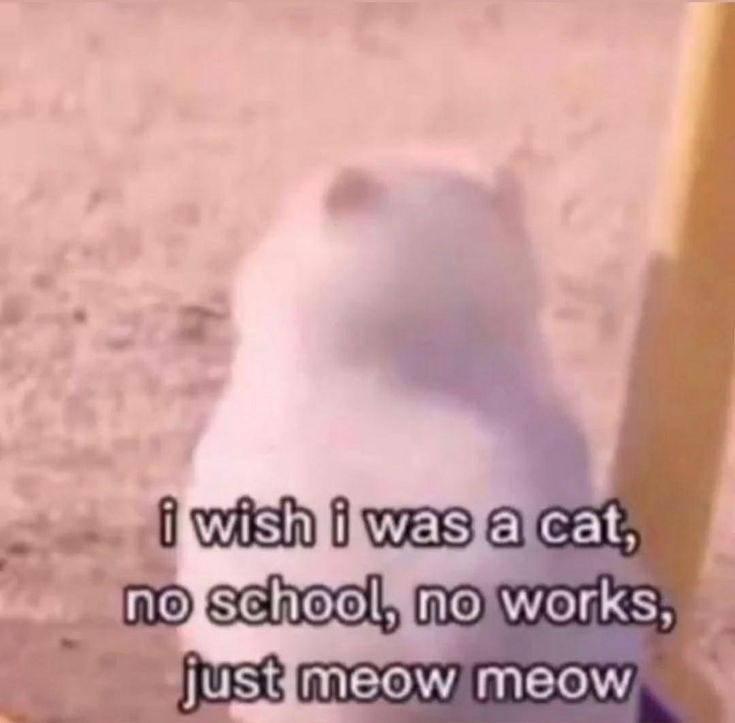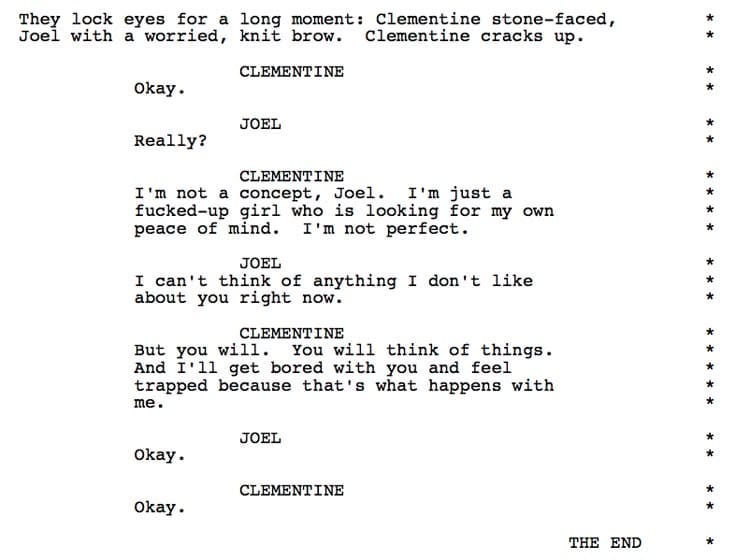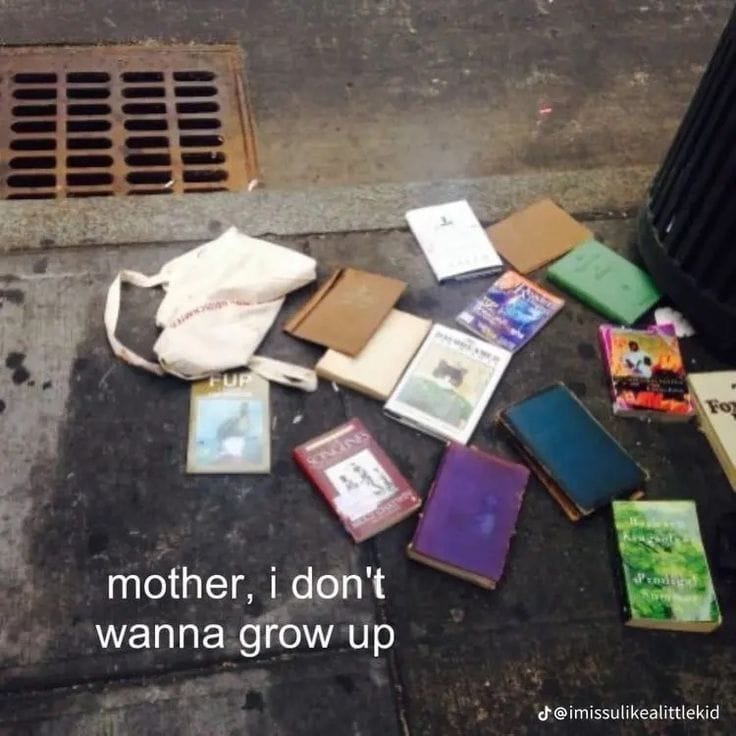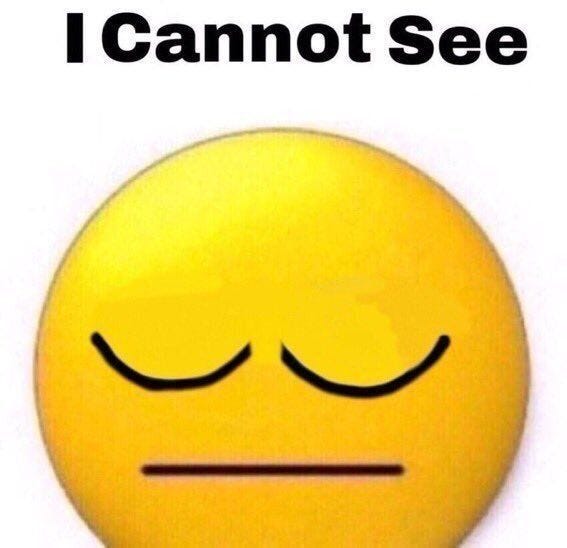it is safe to say that most of us often find ourselves looking at a quiet cat, examining the rewarding silence as it tends to its coat, licking and purring while perched on a sun-drenched windowsill. the kind of comfort reflected in that environment is difficult to be traced anywhere else. look at your life— right before leaving the house, having to check if you turned every switch off, because you somehow seem to care more about melting ice caps than the multimillionaire who will be spending a large part of his day on a private jet, or how about that lump in your throat as you ignore a text you should’ve read hours ago, wait…do you have enough money for this month’s spotify premium subscription? it’s only natural to return your attention to the feline creature and mumble to yourself, “man, i wish i was just a cat.”
in his 1742 poem, “ode on a distant prospect of eton college" thomas gray wrote, "where ignorance is bliss, 'tis folly to be wise.” the latter half of the verse (like the rest of the poem) is conveniently overlooked while quoting the former phrase. the poem is characterised by gray’s observation of a group of boys playing by the river at his old school. gray is overcome by a nostalgic sort of affection towards the innocence of the children, an emotion that turns melancholic upon realizing the inevitability of the sufferings offered by adulthood. therefore, the lines imply that one is better off uninformed in those situations where knowledge can only create pain. now, how do we conclude which context is suitable for disclosing or gatekeeping information? who takes responsibilty to inform others? at what point is their act of withholding considered controlling?
a common psychological bias makes us believe that provided children are unaware of “grown-up” issues such as politics, war, and death, they must be the happiest age range. we assume that the absence of cognitive complexity would lead to emotional stability, or happiness. we forget that unawareness of these issues does not protect them from the consequences. several children across the world grow up under unfavorable economic conditions, parental separation, or academic pressure. moreover, a large part of traumas uncovered during adult years stem from childhood itself. conversely, research shows that people reached their happiest on arriving the age of 70. this is attributed to the existential realizations of old age, hoping to displace their time and efforts towards valuable relationships and meaningful activities. these facts suggest that bliss is attributed not to the absence of knowledge, but rather as a result of greater awareness by learning to live with knowledge.
michel gondry’s eternal sunshine of the spotless mind is a well-liked movie. it explores the relationship of joel and clementine, who took the chance to erase the memories of their volatile relationship. being a romantic drama, the movie ends with the two drawn back together and choosing to give their relationship another chance, despite knowing their past difficulties. even the erasure of memories couldn’t allow the two to truly escape reality. avoiding discomfort is an easy way out, but does not guarantee healing. the true value of their relationship lies in their choice to recognize and remember, and still retry.
it goes without question that there lies a comfort in not knowing. i’m no saint in that context either. avoiding opening a thread regarding a global crisis on twitter (who is calling it x anyway) while being in a rush, not questioning the ethics behind every commercial choice, chuckling to one too many of those “friend who is too woke” memes, scrolling through substack notes mindlessly to avoid clicking on the drafts tab. we frequently prefer to choose the easier way out, and sometimes don’t even notice it consciously.
similarly, there are times when the concept of ignorance can be excused. a child not understanding why his parents cannot afford a toy is not him being ignorant, that is just him being a child. a woman staying in an emotionally draining relationship is not always foolish, several underlying circumstances might go unnoticed if we come to direct conclusions.
however, not all ignorance is this innocent. there lies a significant possibility to harm if we do not consider the additional matters at hand. truth, even if delayed or ignored, does not change its state. we are mindful of the discomfort behind ignorance, yet find it difficult to come to terms with it. ergo, we are stuck in a foggy, restricted area, unable to pick sides but lingering. bliss sounds delightful, but can one feel a true sense of delight while simultaneously being aware of escaped grief, loss, and change? similar to its disguise, truth does not change its state when revealed. on other hand, it is possible that the blow might be harsher and less kind if it is followed by delay.
the dangers behind not knowing are countless and precarious. a terminal illness worsoned. obliviousness towards one’s rights. seclusion from conversation regarding an atrocious past covered by history. being in the dark about a loved one’s dejection.
not to get too plato-y for a substack essay, but the cave allegory naturally comes to mind while considering the concept of knowledge. familiar shadows are easily more warm and comforting, however not enough. we have no active interaction with these “shadows,” and hence can only witness their existence. perceiving the reality behind these shadows may have a harsh beginning, however it is the consequent arrival of reality— of truth, that becomes monumental in coming to terms with the raw, unfiltered nature of everything that is a part of us.
being ignorant means being exposed. if you do not decide for yourself, you allow others to make decisions for you. the practicability of politicians and corporations thriving on our ignorance is testimonial to almost every aspect of our lives. by not speaking up, we often hand over our voices to those who are somehow better at behaving like toddlers than running entire nations. sadly, by the time we realise what we’ve gotten into, it is too late.
not only do we become passive recipients of others’ believes, but also limit our progress by suppressing ourselves to their needs. growth, like the concept of learning, occasionally requires stepping outside one’s comfort zone or confronting ideas that go beyond one’s comprehension. a distorted, rotten sense of peace is just stagnation in disguise.
ignorance is perhaps worse than neutrality. it is substantial obedience. it allows those in power to weaponize against the silent scaffolding we believe to stand with but do not actively oppose. when we find ourselves answering “i didn’t know,” we point fingers at our decisions— or lack thereof. you didn’t know, not because you couldn’t examine, but because you chose to remain unexamined as it seemed more comfortable. except it never is. by choosing to ignore the enroachment performed by systems in power, we willfully let go of several interests that could’ve been advantageous if they remained in our own hands.
i have already mentioned the inability of certain individuals to share the same spaces and resources to seek the truth compared to their privileged counterparts, so it is beside the point to preach awareness as a doctrine in that case. for now, i would like to speak for those who are capable of change, yet remain motionless witnesses. ask difficult questions. open that political article. research the history you weren’t taught. read past headlines. speak up.
if you scrolled this far, thank you so much for reading! it means the world to me. i don’t offer paid subscriptions, however you can always click here and gift a broke girl a little something she wouldn’t be able to get herself, if you would like. thanks again :)









the “i cannot see” meme 😭😭 i loved this though! it’s so important
I loved this. Fantastic writing